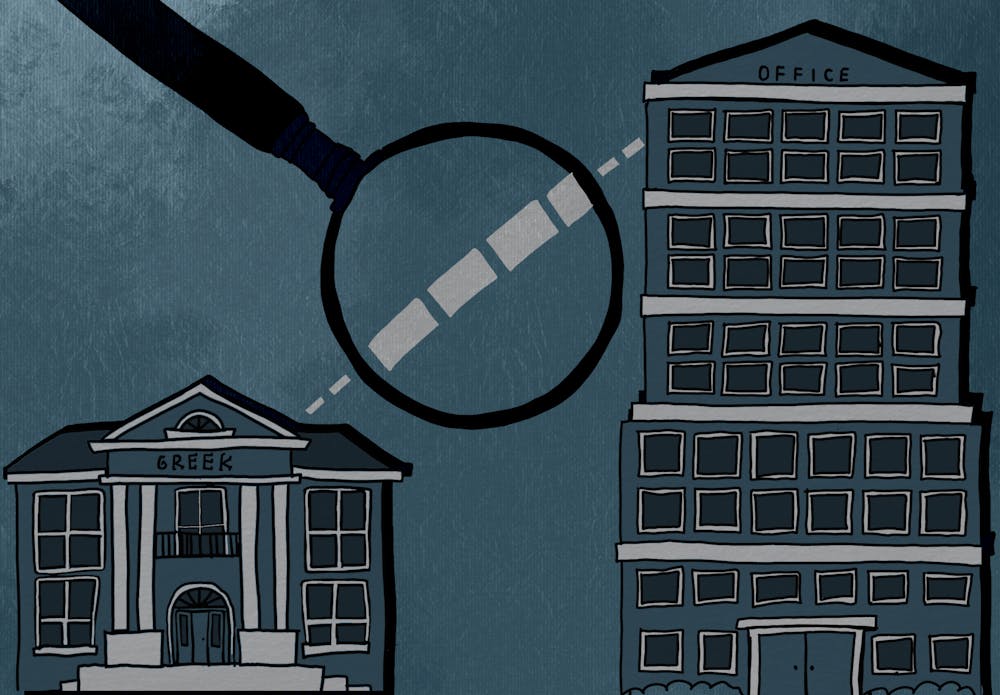“Welcome to Miami.” Pitbull’s haunting voice echoes all around you, but you are not standing on South Beach. You are likely standing in a fraternity on Rugby Row. The presence of Greek Life on Grounds is huge whether or not you are a member, but it is also a polarizing topic as reflected by recent hazing scandals and a growing movement to ban Greek life. Regardless of how one feels about fraternities, studies reveal that their impact on students’ careers after graduation is undeniably positive. The socialization that occurs within a fraternity shows clear ties to better jobs and higher salaries after graduation. In many ways, Greek life disproves the myth of meritocracy. We live in a society that preaches the value of hard work, but all too often values networks more than actual merit. Given this reality, understanding how Greek life works to achieve a competitive edge can allow other clubs and organizations to help their own members advance in society too.
Regardless of work ethic, it seems as though the rungs of the corporate ladder are harder to reach for some people than others. For example, despite being paid significantly more, research shows that graduates of high-ranked universities only have a 1.9 percent advantage over the average graduate in workplace productivity. Fraternity members, however, seem to have a fast pass to workplace success. The study “Social Animal House” found that fraternity members earned a 36 percent higher income than those of non-members. This startling study additionally uncovered that immediate employment opportunities after college increase for fraternity alumni, while controlling for potentially compounding factors like location and demographics. This is a trend worth examining for any corporate go-getter.
The reason for the substantial increase in earnings is the way Greek life depends on “social capital” — value created through community bonds — to create positive opportunities for members. By promoting togetherness in a fraternity and de-emphasizing academic achievement, fraternities prove that community, especially one created by bringing together a group of people over several years, is often more important than simple ability. This community creates one of the most powerful tools in the career world — networking opportunities.
Decades-old fraternity alumni networks are often so wide that they can produce lists of names of influential alumns that members should seek out in job searches. The specificity and breadth inherent in this system produces its power. Being able to name-drop past “brothers'' does more than get you into the door of a frat. It will get you in the door of many top companies — 42 of the nation’s top 50 companies are owned by alumni of Greek organizations, a staggering statistic that speaks to the power fraternities wield in workplaces. Clearly, belonging to a large network of professionals is beneficial to the network’s members, and it would be in extracurriculars' best interest to replicate these benefits.
A powerful emphasis on social capital has allowed members to make connections that are beneficial to their careers, but these networks also foster a space where destructive behavior thrives in silence. Research shows that fitting in is often more important than merit and that loyalty is highly valued. As a result, the incentive to report incidents of problematic behavior within fraternities is removed as to not move against the grain and risk expulsion. This failure, in turn, creates a culture of exclusion and secrecy, and means that a sludge of vile activity like sexual assault and hazing remains prevelent within these organizations. Career opportunities do not excuse these appalling realities.
The side effects of extreme loyalty naturally discourages other organizations on Grounds from emulating any aspects of Greek life, good or bad. As such groups may be hesitant to improve their social capital for fear of producing the exclusion and toxicity that pollutes fraternities. However, this means that many organizations on Grounds have closed themselves off to the reality of our world — often, a mutual connection is more valuable than any experience the club can provide. Please don’t mistake this for an exaltation of fraternity nepotism, but clearly Greek organizations are doing something right. The numbers don’t lie — fraternity alumni have a much easier time in the job market than others and make more money. So what should other extracurriculars do on Grounds to ensure a large alumni network to further their members’ careers after graduation?
It is difficult to imagine a world where perfect harmony is found. However, extracurricular groups on Grounds would do well to conduct trial and error experiments with elements of the Greek model such as the alumni networks. The most effective version of this would be networking opportunities that clubs create by working to connect their often large but underdeveloped alumni population. Perhaps a system of a highly cooperative alumni network could be achieved even with inclusivity and accountability. If the University is filled with the smart and empathetic students we know it is, eventually we could achieve the same career improvements that fraternities experience while avoiding the toxicity. Of course, Pitbull will still be involved.
Paul Kurtzweil is a senior associate opinion editor who writes about economics, business and housing for The Cavalier Daily. He can be reached at opinion@cavalierdaily.com.
The opinions expressed in this column are not necessarily those of The Cavalier Daily. Columns represent the views of the authors alone.







